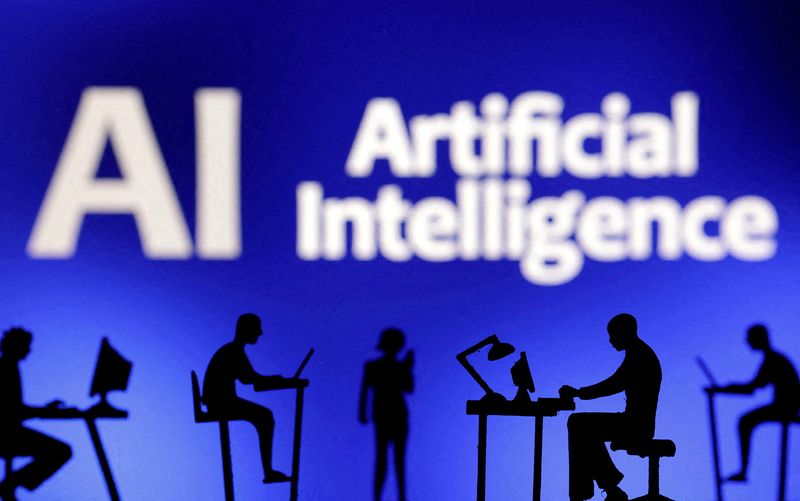By Jamie McGeever
ORLANDO, Florida (Reuters) – Technology has been the main driving force behind the evolution of financial markets in recent decades, with the explosion of automated and algorithmic trading fostering the eye-popping speed, efficiency, and liquidity that traders and investors enjoy today.
Artificial intelligence is likely to accelerate these positive changes and revolutionize financial markets along the way.
But with the benefits come potential dangers, including the risk that markets will become more vulnerable to frequent bursts of short-term turbulence and volatility.
Generative AI technologies like ChatGPT may be in their infancy, but their use across society is mushrooming at an alarming rate. Generative AI’s adoption rate since its mass launch nearly two years ago is 39.4%, according to a blog post last month by St. Louis Fed economist Alexander Bick, Vanderbilt University’s Adam Blandin and Harvard’s David Deming. That’s twice the adoption rate for the personal computer three years after its mass introduction, and the internet after two years.
And St. Louis Fed economists and researchers Aakash Kalyani, Serdar Ozkan, Mickenzie Bass and Mick Dueholm noted in a separate blog last month that AI-related chatter in company earnings calls has increased over fivefold since the launch of ChatGPT in late 2022.
The financial industry is taking part in this trend. The International Monetary Fund notes that when Large Language Models first appeared in 2017, only 19% of patent applications related to algorithmic trading featured AI content. That figure jumped to more than 50% in 2020 and has remained above that level ever since. This suggests a “wave of innovation” in financial markets could be coming.
This could be very good news for the financial industry, as AI has the potential to take the efficiency of trading, investment and asset allocation to new heights.
Generative AI’s ability to instantaneously analyze vast quantities of information could enhance market performance by generating more accurate trading signals, improving risk management, strengthening trading models, and spotting trends.
AI also has the potential to improve liquidity and help iron out price distortions in markets with a wide range of instruments that don’t lend themselves to automated trading, like corporate bonds.
It may even enhance returns. A working paper published in May by University of Chicago researchers Alex G. Kim, Maximilian Muhn and Valeri V. Nikolaev found evidence that investors may be able to deliver higher cumulative returns over time by following investment signals from simple ChatGPT-based analysis. The technology’s apparent ability to “uncover value in smaller stocks” is a notable feature.
True, if everyone is using the same technology, any trading benefit could wane over time, but this would likely only fuel the drive for greater innovation as investors seek to remain one step ahead.
CASCADING AND HERDING
Of course, there are serious risks as well.
The IMF highlighted a few of them in its latest Global Financial Stability Report, following discussions with an extensive range of stakeholders, including banks, dealers, AI vendors, asset managers, academics, and market infrastructure firms.
One of the most pertinent concerns is the potential for a sudden evaporation of liquidity, and even the cessation of trading, during periods of high volatility as market participants scramble to minimize losses. Algorithmic trading strategies, enhanced by AI, could create a “cascading” effect triggering negative feedback loops.
The risk of “potential herding and market concentration” is particularly acute, the IMF notes, if only a handful of providers are designing the AI programs and Large Language Models that are enhancing these algos. This is likely the case right now.
The IMF notes that there is already evidence the U.S. stock market has seen algo-driven liquidity dry up – albeit only briefly – during times of high stress. This reflects that fact that many participants are essentially on the same side of trades and their models are designed to respond to many situations in the same way.
In addition, AI is likely to accelerate the shift of market-making activities to less regulated corners of the financial universe like hedge funds, proprietary trading firms, and other non-bank financial intermediaries.
Increased opacity will make it harder for regulators and authorities to monitor these activities, which, in turn, could create more opportunities for cyberattacks, market manipulation, fraud, and online dissemination of disinformation.
But there is no going back to the pre-AI world. Markets have little option but to accept and embrace technology. This means investors – and financial regulators – have to accept the potential risk, disruption and danger AI could bring along with its many benefits.
(The opinions expressed here are those of the author, a columnist for Reuters.)
(By Jamie McGeever; Editing by Paul Simao)




























